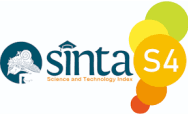KARAKTERISTIK TUTURAN HUMOR
Abstract
This study aims to describe the form of violations of the principle of cooperation in the humorous book “Lucu-Lucu Tokoh Dunia” by Isa An. Tamami. The principle of cooperation is a principle that is used as a guideline in communication activities, by applying the four maxims in it, namely the maxim of quantity, the maxim of quality, the maxim of relevance, the maxim of implementation / method. In the conversation humor book “Lucu-Lucu Tokoh Dunia” Figures found elements of violations of the principle of cooperation, so this is what attracts the attention of researchers to make research in pragmatic studies. The method used in this study is descriptive qualitative. The focus of this study lies in the problem of violating the principle of cooperation used in humorous conversations using reading methods and note-taking techniques and certain tips, namely coding and marking each conversation in pencil, with the aim of classifying data according to its maxims. The results of this study indicate that the violation of the principle of cooperation maximizes the quantity used in some humorous book “Lucu-Lucu Tokoh Dunia” conversations is greater than the violation of the principle of cooperation in the maximal implementation / method carried out. Violations of the principle of cooperation can occur because speakers do not understand the context of the conversation, besides that violations are also carried out as a means of creating humor, such as criticizing, insinuating, and entertaining. The researcher found a characteristic form of violation of maxims of quantity, the maxim of quality, the maxim of relevance, the maxim of implementation/method which included: speech characteristics, kibul speech forms, intersection speech forms, ambiguous speech forms. Examinations contained in the humorous book " Lucu-Lucu Tokoh Dunia " often violate the principle of cooperation. That is because to create a funny impression on the utterance.
Keywords
Full Text:
PDFReferences
Aliah, Y. (2014). Analisis Wacana Kritis dalam Multiperspektif. Bandung: PT Refika Aditama.
Anastasya. (2013). Teknik-teknik Humor dalam Progaram Komedi di Televisi Swasta Nasional Indonesia. E-Komunikasi.
Anis, M. Y. (2013). Humor dan Komedi dalam Sebuah Kilas Balik Sejarah Sastra Arab. CMES.
Chaer, A. (2010). Kesantunan Berbahasa. Jakarta: PT Rineka Cipta.
Djatmiko. (2016). Mengenal Pragmatik Yuk!? Yogyakarta: Tata Aksara
Nadar. (2009). Pragmatik dan Penelitian Pragmatik. Yogyakarta: Graha Ilmu.
Sudaryanto. (2015). Metode dan Aneka Teknik Analisis Bahasa. 2015: Sanata Dharma University Press.
Tamami. (2018). Lucu-lucu Tokoh Dunia. Yogyakarta: Araska.
Sugiarto, V. D. (2016). Teknik Humor dalam Film Komedi yang Dibintangi oleh Stand Up Comedia. Jurnal E-Komunikasi Program Studi Ilmu Komunikasi Universitas Kristen Petra, Surabaya.
Rahardi, K., Setyaningsih, Y., & Dewi, R. P. (2016). Pragmatik. Yogyakarta: PT. Gelora Aksara Pratama.
Faridah, S. (2017). Fungsi Pragmatis Tuturan Humor Madhin Banjar. Kredo.
Jatmikol, H. T., Setiawan, B., & Sulistyo, E. (2017). Fungsi Bahasa dalam Wacana Transaksi Jual Beli di Pasar Klewer dan Relevansinya Sebagai Materi Pembelajaran Bahasa Indonesia di SMA. Elic.
Kurniawan , Y. (2017). Teknik Penciptaan Humor dalam Komik Tahilalats di Webtoon. Sastra Indonesia.
Lestari, T. P. (n.d.). Pelanggaran Prinsip Kerjasama Sebagai Sarana Pengungkapan Humor dalam Wacana Lisan Komika Dodit Mulyanto. Seminar Nasional Prasasti.
Marwan, I. (2013). Rasa Humor dalam Perspektif Agama. Al-Turas.
Rahardi, K. (2003). Bekenalan dengan Ilmu Bahasa Pragmatik. Malang: Penerbit Dioma.
Ulam, A., Emzir, & Nuruddin. (2018). Analisis Linguistik Prinsip Kerja Sama dalam Tuturan Cerita Humor Nawadir Juha Li Al-Athfal. Arabic Studies.
Yule, G. (2014). Pragmatik. Yogyakarta: Pustaka Belajar
DOI: https://doi.org/10.32528/bb.v4i2.2557
Refbacks
- There are currently no refbacks.
Copyright (c) 2019 BELAJAR BAHASA

This work is licensed under a Creative Commons Attribution 4.0 International License.
Address:Jl. Karimata No. 49 Jember-Jawa Timur-Indonesia
Phone & Fax:(0331)336728 | 337957
Email:belajarbahasa@unmuhjember.ac.id









